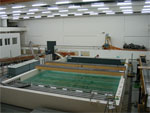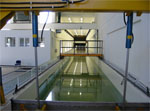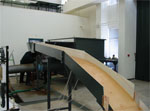
The purpose of the Hydraulic Engineering Laboratory (
www.hydraulics.civil.upatras.gr) of the Civil Engineering Department, University of Patras, is to support teaching and promote research in the related scientific field.
The Laboratory equipment includes instruments for the determination of fluid properties (viscosity, specific gravity etc), two variable slope channels, one with dimensions 8m length, 0.30m width and 0.40m depth and a smaller one of 4.8m length, 0.075m width and 0.15m depth, as well as a number of hydraulic benches with accessories, that are used in laboratory exercises related to the principles of conservation of energy and momentum in closed conduit and open channel flow. In addition, equipment is available for the study of specialized topics sush as water hammer, performance of pumps, rainfall and surface runoff, and flow through porous media. Finally, the Laboratory is equiped with instruments for the field measurement of velocities in rivers and coastal waters, the performance of pumping tests in aquifers, etc.

In the new building of the Civil Engineering Department, the facilities of the Hydraulic Engineering Laboratory include an open channel with 58m length, 2.80m width and 1.50m depth, for large scale experiments. The channel is supplied with water by a recirculating system from an underground water basin. In addition, there is a wave tank and space for the construction of physical models. Finally, water supply to various experimental set ups is possible through a number of outlets, located at selected points in the Laboratory, which are also part of a "closed" recirculating water system supplied by a constant head tank.
The Laboratory participates actively in the Departmental Graduate Program through courses and research, including projects funded by private, national or EC organisations. The scientific interests and research activities of the Laboratory staff include the following :
 Experimental study of flow and transport of pollutants in open channels
Experimental study of flow and transport of pollutants in open channels- Turbulence models
- Transport and diffusion/dispersion of pollutants in surface waters
- Numerical methods (control volume, finite elements, boundary elements)
- Influence of climatic changes on watersheds
- Methods of organic pollutant removal from the unsaturated zone
- Coastal circulation
- Density currents
- Nearshore outlets and transport phenomena
- Coastal structures
- Hydraulic structures
The Laboratory staff includes five faculty members, one teaching assistant and one technician.
Professor
Alexander Demetracopoulos is Director of the Laboratory of Hydraulic Engineering (tel. +3061-997679, e-mail
acdem@upatras.gr)
Back